Jeremie Averous's Blog, page 90
May 12, 2016
Why We Should Avoid Moralistic Judgments
As a personal discipline, we should refrain from moralistic judgments. This creates new perspectives. I love this quote: “Out beyond ideas of wrongdoing and right-doing, there is a field. I’ll meet you there.” – Rumi.
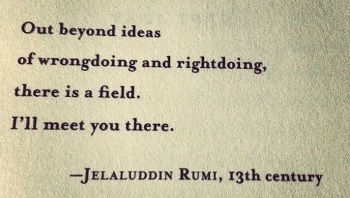 One other reason is that we are often wrong on our moralistic judgments, because we don’t know the circumstances that led to what we observe. It is so easy to be imprisoned in one’s frame of mind and not see that the situation is perfectly explainable in a moral way.
One other reason is that we are often wrong on our moralistic judgments, because we don’t know the circumstances that led to what we observe. It is so easy to be imprisoned in one’s frame of mind and not see that the situation is perfectly explainable in a moral way.
“One kind of life-alienating communication is the use of moralistic judgments that imply wrongness or badness on the part of people who don’t act in harmony with our values.” writes Marshall B. Rosenberg in ‘Nonviolent Communication: A Language of Life‘. Indeed jumping immediately to moralistic judgments can be deeply life alienating. Just avoid it.

May 10, 2016
Why We Should Focus on Our Energy Level
More and more I find that focusing on my personal energy level is the right way to go. “The way I approach the problem of multiple priorities is by focusing on just one main metric: my energy. I make choices that maximize my personal energy because that makes it easier to manage all of the other priorities.” writes Scott Adams in his book ‘How to Fail at Almost Everything and Still Win Big: Kind of the Story of My Life‘.
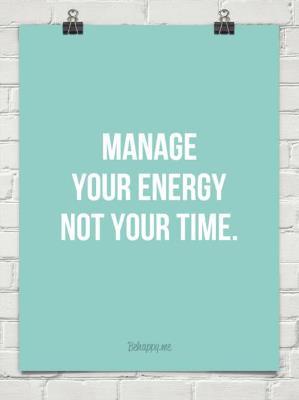 My energy level is directly correlated with whether I am keen to perform certain tasks or engage in certain work. Also, it is clearly relevant to stop working on something when energy is low: production will anyway be poor too!… Better do something to regenerate at that time!
My energy level is directly correlated with whether I am keen to perform certain tasks or engage in certain work. Also, it is clearly relevant to stop working on something when energy is low: production will anyway be poor too!… Better do something to regenerate at that time!
Managing one’s energy level through the day is also important, and it is where what we eat and drink (like coffee) comes in to make sure we keep the relevant level.
I also struggle with a particular energy-killer: jet lag. That does not help because it is difficult to remain adjusted to the local natural rhythm, creating unexpected energy troughs and highs.
At the end, managing our energy and responding to its variations are probably an essential skill in the modern world. And you, how do you manage your energy?

May 7, 2016
Why it is Important to Better Control Our Attention
“People who have better control of their attention, emotions, and actions are better off almost any way you look at it. They are happier and healthier. Their relationships are more satisfying and last longer. They make more money and go further in their careers. They are better able to manage stress, deal with conflict, and overcome adversity. They even live longer.” [Kelly McGonigal]
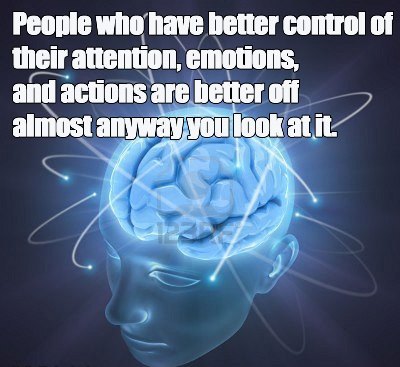 Having better control and awareness of one’s emotions requires practice and continuous attention, because it is not straightforward. Practices such as meditation or just paying attention to what happens right now are not promoted by our modern way of life.
Having better control and awareness of one’s emotions requires practice and continuous attention, because it is not straightforward. Practices such as meditation or just paying attention to what happens right now are not promoted by our modern way of life.
Still personally I find great benefits in managing to extract myself from the stress of the daily grind and take some distance. This requires often focusing attention on myself (like my breath), and allows to consider the situation at hand in a much wider and comprehensive manner. It is not always easy but always worthwhile. And you?
Quote from an excellent post by Valeria Maltoni Using Curiosity to Break Bad Habits

May 5, 2016
How Fourth Revolution Disruption is Often Only About a New Intermediation
In this interesting paper ‘Uberization: will the empire strike back?‘ the authors analyze the fear of getting disrupted (also know as getting ‘uberized’) that stress many traditional actors. They show however that it is generally a trend in a new type of intermediation (brokering), and not the disappearance of intermediation per se: “The market – like the nature of yore – abhors a vacuum. Very often, de-intermediation is just a phase of re-intermediation.”
 Many consider the emergence of services like Uber as a kind of de-intermediation between consumers and providers. But in reality, it is about providing a new, upgraded intermediation capability that creates much value – it will include powerful algorithms and sometimes Artifical Intelligence to best suit our needs to what can be provided. Already Amazon is a model of an upgraded intermediation with its recommendations. Uber creates a new intermediation capability in the field of personal mobility. In both cases it gives a way for certain marginal providers to make their product available to a wider public, while under the previous infrastructure they were not sufficiently interesting to be considered by the intermediation system.
Many consider the emergence of services like Uber as a kind of de-intermediation between consumers and providers. But in reality, it is about providing a new, upgraded intermediation capability that creates much value – it will include powerful algorithms and sometimes Artifical Intelligence to best suit our needs to what can be provided. Already Amazon is a model of an upgraded intermediation with its recommendations. Uber creates a new intermediation capability in the field of personal mobility. In both cases it gives a way for certain marginal providers to make their product available to a wider public, while under the previous infrastructure they were not sufficiently interesting to be considered by the intermediation system.
Nothing new under the sun then – the Fourth Revolution just gives us a new distributed power and communication system that allows a much more powerful intermediation to be implemented between consumers and promoters. It does disrupt traditional actors, only if they do not recognize that monopolies are here to be broken.

May 3, 2016
How It Can Sometimes Be Difficult to Disrupt Traditional Industries
Talk about disruption of whole industries by the internet is everywhere. Yet that does not work out all the time. The dabbawalas are a famous organization in Mumbai delivering every day to workers in town-center meals prepared by their family in the outskirts – all with a very low percentage of error. As reported by Bloomberg ‘Startups Haven’t Replaced India’s 19th Century Food Delivery Service‘, many start-ups have attempted to displace them in the past years and they have all failed.
 Dabbawala in action at a station in Mumbai
Dabbawala in action at a station in MumbaiThis goes to show that it is not so easy to disrupt traditional processes even in the area of distribution, in particular when cultural aspects need to be taken into account (Indian workers seem to largely prefer home-made meals, possibly on hygiene grounds and/or family pressure! – and they appear reluctant to order meals from restaurants).
As a hypothesis for this interesting failure, the fact that those startups have tried to replace at the same time the distribution system and the sourcing of the product. This might have worked in some instances (Uber, Airbnb) but that remains a very rare occurrence.
This reminds us that we need to always remain very humble when it comes to disrupting any kind of industry or process!

April 30, 2016
How Failure is where Success Likes to Hide in Plain Sight
I like very much that quote: “Failure is where success likes to hide in plain sight. Everything you want out of life is in that huge, bubbling vat of failure. The trick is to get the good stuff out” writes Scott Adams (of Dilbert fame) in the excellent book ‘How to Fail at Almost Everything and Still Win Big: Kind of the Story of My Life‘.
 If we try new things and get out of our comfort zone we’ll be confronted by failure more than once. It is tough psychologically and practically to overcome failure. Still we always need to dig further to discover what is worth saving, or what nugget of success lies there in the rubbles.
If we try new things and get out of our comfort zone we’ll be confronted by failure more than once. It is tough psychologically and practically to overcome failure. Still we always need to dig further to discover what is worth saving, or what nugget of success lies there in the rubbles.
Scott Adams concludes, “Failure always brings something valuable with it. I don’t let it leave until I extract that value.”. Do you have the discipline to do that?

April 28, 2016
Why You Should Have a Success System Rather Than Success Goals
Scott Adams in the excellent book ‘How to Fail at Almost Everything and Still Win Big: Kind of the Story of My Life‘ is strongly against setting goals. He advocates rather develop a system for success and stick to it – and be ready to capture opportunities when they pop up at the right time.
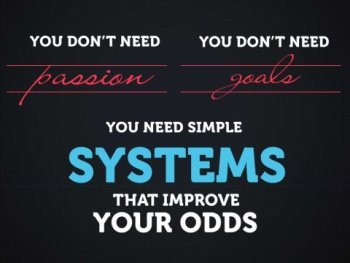 The main reason according to him is the conservation of personal energy: “Goal-oriented people exist in a state of continuous pre-success failure at best, and permanent failure at worst if things never work out. Systems people succeed every time they apply their systems, in the sense that they did what they intended to do. The goals people are fighting the feeling of discouragement at each turn. The systems people are feeling good every time they apply their system. That’s a big difference in terms of maintaining your personal energy in the right direction”
The main reason according to him is the conservation of personal energy: “Goal-oriented people exist in a state of continuous pre-success failure at best, and permanent failure at worst if things never work out. Systems people succeed every time they apply their systems, in the sense that they did what they intended to do. The goals people are fighting the feeling of discouragement at each turn. The systems people are feeling good every time they apply their system. That’s a big difference in terms of maintaining your personal energy in the right direction”
I find this viewpoint very interesting and challenging. Establishing a system that works consistently and reliably allows to avoid focusing on challenging goals that might never be reached, and allows to focus on a daily routine that will bear fruit. Hence for 2016 I have decided to focus my effort more on setting up a system than setting goals. And you?

April 26, 2016
How Passion May Develop Around Mastery
Following on our previous post about the fact that “follow your passion” might be bullshit, some authors take a position that actually passion develops by learning doing very well a useful work. That is to say, passion would develop slowly around mastery.
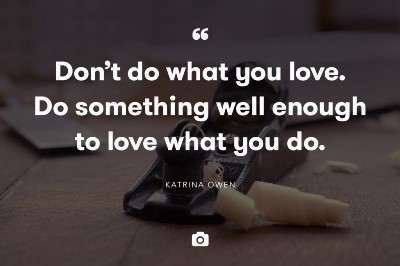 I find that it is a very interesting point of view that is worth considering. Mastering some technique is a way to elevate self-confidence, something that can found one’s identity, and become a real passion that defines oneself.
I find that it is a very interesting point of view that is worth considering. Mastering some technique is a way to elevate self-confidence, something that can found one’s identity, and become a real passion that defines oneself.
Passion would then not be just intrinsic, but develop as a response to external feedback.
Truth probably lies between those two opposites: we may be attracted by certain things irrespective of our experience or capabilities, and passion may develop around mastery of certain techniques as well. When both meet somehow, a miracle will occur. It is probably quite rare, and remarkable.
Seek your passion in what you master, and master what interests you. And find the sweet spot at the confluence. Do you see it?

April 23, 2016
Is ‘Following your Passion’ a Bullshit Advice?
“Passion Is Bullshit” writes Scott Adams in the excellent book ‘How to Fail at Almost Everything and Still Win Big: Kind of the Story of My Life‘. This is quite a contrarian statement, as many today advise to follow one’s passion to truly live a fulfilled life.
According to Scott Adams, this advice would be an illusion, fostered by the fact that successful people assign their success to passion but it is not proven that it was the origin of their success: “It’s easy to be passionate about things that are working out, and that distorts our impression of the importance of passion”
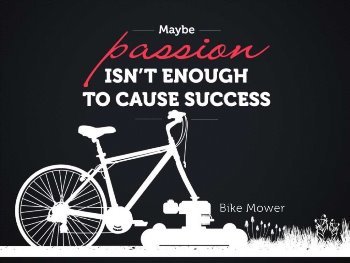 Moreover, he believes that passionate people are less susceptible to be successful, because “passionate people are more likely to take big risks in the pursuit of unlikely goals, and so you would expect to see more failures and more huge successes among the passionate“.
Moreover, he believes that passionate people are less susceptible to be successful, because “passionate people are more likely to take big risks in the pursuit of unlikely goals, and so you would expect to see more failures and more huge successes among the passionate“.
Finally, he remarks that “If you ask a billionaire the secret of his success, he might say it is passion, because that sounds like a sexy answer that is suitably humble. But after a few drinks I think he’d say his success was a combination of desire, luck, hard work, determination, brains, and appetite for risk“.
 This point of view is definitely contrarian in a world where ‘follow your passion’ is a basic advice (in particular since Steve Jobs “follow your heart” famous speech in 2005), and I think it should make us think a bit about this element of popular culture.
This point of view is definitely contrarian in a world where ‘follow your passion’ is a basic advice (in particular since Steve Jobs “follow your heart” famous speech in 2005), and I think it should make us think a bit about this element of popular culture.
It is true that passion only can’t be the single recipe for success. It is also important to have skills that can be sold, and sometimes people are very happy having their passion develop outside a more common salaried job.
The next time you see ‘follow you passion’ advice, stop a few minutes to think if that is reasonable when it comes to what you are really passionate about!

April 21, 2016
Why the quality of our attention matters above all
“It’s not what you do that counts, it’s the quality of your attention.” (quoted from Marshall B. Rosenberg – ‘Nonviolent Communication: A Language of Life‘).
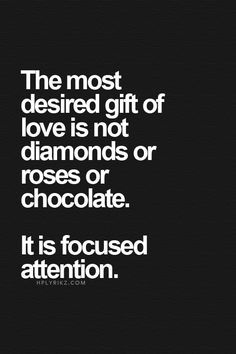 Attention we give to people is what counts in the end. It requires practice and focus to avoid distractions and be able to give the attention people need. But in the end it is what counts.
Attention we give to people is what counts in the end. It requires practice and focus to avoid distractions and be able to give the attention people need. But in the end it is what counts.
This becomes increasingly difficult in today’s world with all its interruptions, buzzes and rings. It is why is becomes ever more rare and valuable, and people notice. It is sometimes enough to give full attention for a few minutes to create a relationship that will last years.
Work to create those spans of attention and nurture real relationships with people that matter to you.




